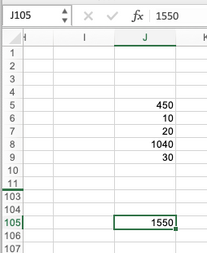- Home
- Microsoft 365
- Excel
- Re: Adding a column of cell numeric values to total within an excel macro.
Adding a column of cell numeric values to total within an excel macro.
- Subscribe to RSS Feed
- Mark Discussion as New
- Mark Discussion as Read
- Pin this Discussion for Current User
- Bookmark
- Subscribe
- Printer Friendly Page
- Mark as New
- Bookmark
- Subscribe
- Mute
- Subscribe to RSS Feed
- Permalink
- Report Inappropriate Content
May 23 2023 05:43 PM - edited May 23 2023 05:44 PM
Hello. I've tried to find on the web how to add cell numbers to a counter in an excel macro but can't find any examples.
I've tried defining the total field: DIM integer, long, double, variable.
I've tried defining the cell range as value, formula, without any extension.
I'll post a piece of my program below. Please help, thank you:
Sub TotalAccount()
' TotalAccount Macro
' "G" row cells formatted as numeric, 0 decimal places
' The cell value is never more than 5000
' TotalAcct value will never exceed 500,000
' 1st 5 values in row J: 450, 10, 20, 1040, 30
' Totalacct should be 1550 but is 30 (last value in list)
'----------------------------------------------------------
Dim Cellrow As Integer
Dim Numbercell As Integer
Dim Totalacct As Integer
Totalacct = 0
For Cellrow = 5 To 104
Numbercell = Range("J" & Cellrow)
Totalacct = Totalacct + Numbercell
Next Cellrow
Cellrow = 105
Range("J" & Cellrow) = Totalacct
End Sub
- Labels:
-
Macros and VBA
- Mark as New
- Bookmark
- Subscribe
- Mute
- Subscribe to RSS Feed
- Permalink
- Report Inappropriate Content
May 23 2023 06:35 PM
And I would suggest use formular instead of marco, or
Range("J105") = Application.WorksheetFunction.Sum(Range("J5").Resize(100, 1))
- Mark as New
- Bookmark
- Subscribe
- Mute
- Subscribe to RSS Feed
- Permalink
- Report Inappropriate Content
May 23 2023 08:00 PM
Hello. Thank you for your answer.
I believe the DIM statement for the counter or accumulator might not be integer
but something else. Is this correct? Dim Totalacct As Integer
Also, the statement that is accumulating numbers isn't doing so:
The Totalacct variable is the accumulating the numbers in row J.
After the following: Cellrow).value or Cellrow).formula might
be incorrect.
Numbercell = Range("J" & Cellrow)
Totalacct = Totalacct + Numbercell
- Mark as New
- Bookmark
- Subscribe
- Mute
- Subscribe to RSS Feed
- Permalink
- Report Inappropriate Content
May 23 2023 09:06 PM
@Tommee Can't really understand why you would want to do this with a macro but that's your choice. Pasted your code into a module and filled cells J5:J9 with the numbers you mentioned. Ran the code and the result of 1550 correctly shows in J105. See attached.
